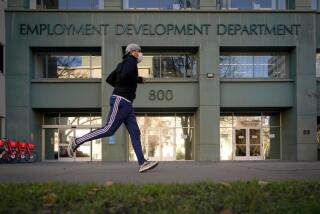Judge Refuses to Drop Charges in ‘Pay or Die’ Extortion Case
- Share via
A San Fernando Superior Court judge refused Wednesday to dismiss charges against two men accused of mailing extortion letters to hundreds of prominent Antelope Valley residents, saying the prosecution has convinced him the defendants are guilty and the defense must now prove otherwise.
Judge Ronald S. Coen rejected a defense motion to dismiss the case on the 12th day of the trial of Richard Faroni and Roman Makuch, two former Lancaster aerospace technicians charged with attempted extortion and conspiracy. At least 267 “pay-or-die” letters, mailed in November, 1988, demanded millions of dollars from victims. No money was ever collected.
Coen is hearing the case without a jury, at the request of the defense. The law thus requires him to apply a higher standard of evidence in weighing the dismissal motion than he would in a jury trial, Coen said.
“The standard is whether I am convinced beyond a reasonable doubt,” Coen said. “I am convinced that they are guilty.”
He compared the extortion scheme to a childlike fantasy, or something out of Soldier of Fortune magazine.
The ruling rebuffed the central defense argument that the evidence, which Deputy Dist. Atty. Stephen L. Cooley has described as circumstantial and diverse, did not connect Makuch and Faroni to the extortion scheme and therefore did not require refutation.
And it sets the stage for the potentially dramatic climax of a bizarre case that caused a furor in the Antelope Valley: testimony by Makuch and Faroni, whom witnesses have described as intelligent, eccentric loners who lived in a cloak-and-dagger world of their own making.
Cooley said he looks forward to cross-examining Makuch and Faroni, who have spent more than a year in jail and face eight years in prison if convicted.
“We are over a major hurdle,” Cooley said. “The ball is now in their court. Their primary thrust was that we didn’t have the evidence.”
The prosecution argued that Makuch and Faroni had the interest and ability to gather the information needed to produce letters containing detailed personal information about victims. Witnesses said Makuch and Faroni bragged about mysterious surveillance they appeared to be conducting with high-tech equipment.
Despite the lack of direct evidence, Cooley said his case was strengthened by small but significant links such as testimony that Makuch and Faroni knew and disliked the only letter recipient who was not prominent in the community.
Defense attorneys William A. Clark and Jo Ann Stipkovich said they probably will call Makuch and Faroni to the stand, though Clark said his decision is not yet final. Clark said Coen’s ruling was based on Cooley’s “sojourn into the realm of speculation.”
“Either the judge is terribly impressed with the evidence or he wants to hear from the defense,” Clark said. “I don’t consider the evidence to be overwhelming.”
If Makuch and Faroni testify, Clark said, they will prove frustrating witnesses for the prosecution because they are “extremely agile” mentally and eager to testify on their own behalf.
“They are anxious to let it all hang out,” he said.
More to Read
Sign up for Essential California
The most important California stories and recommendations in your inbox every morning.
You may occasionally receive promotional content from the Los Angeles Times.













